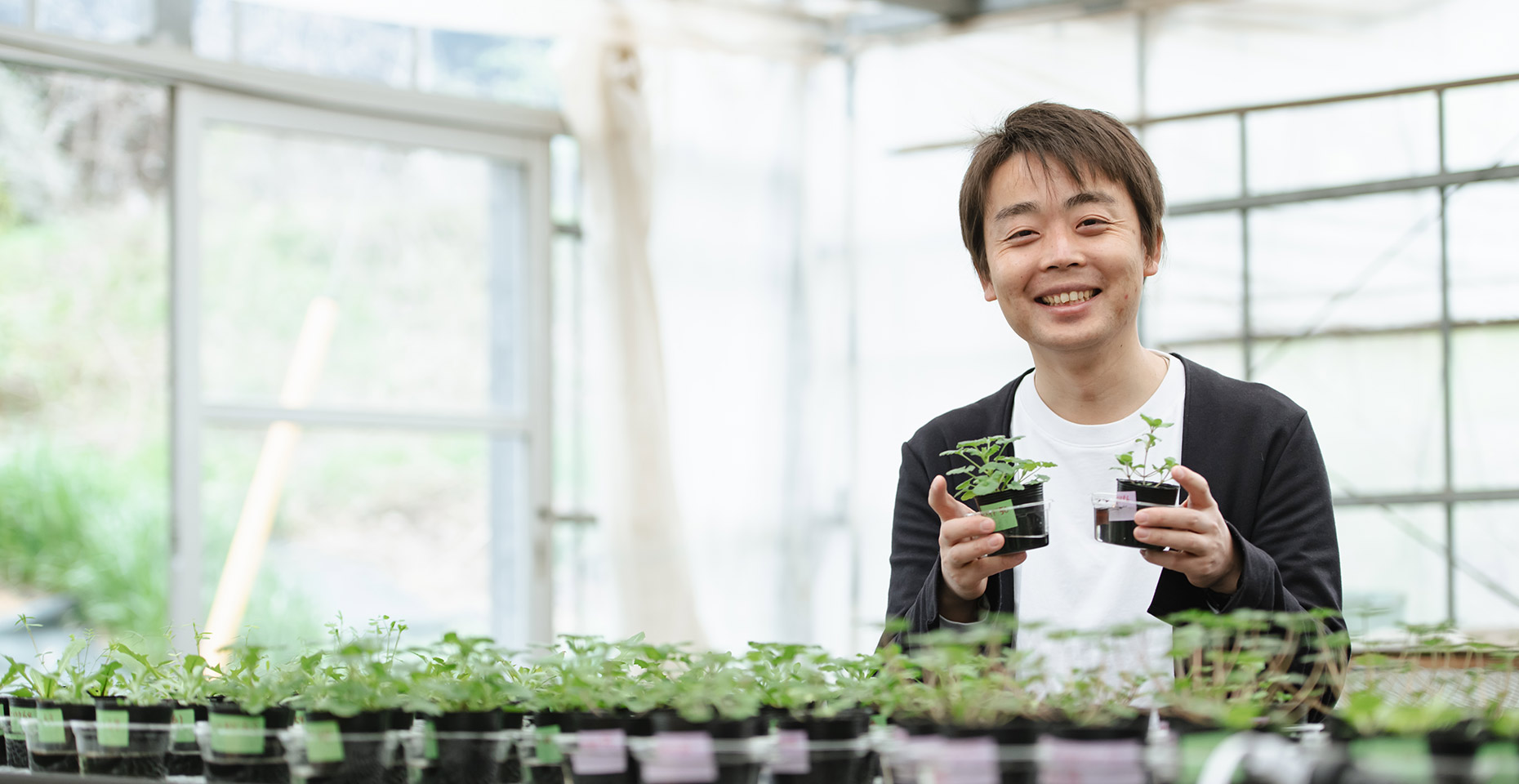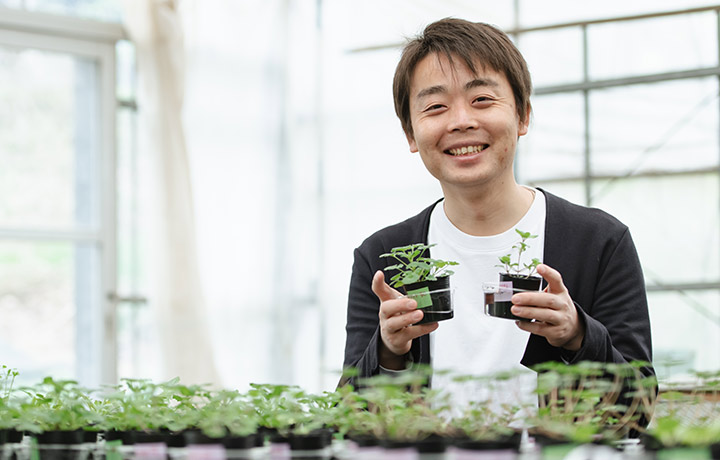Efforts to protect biodiversity are increasingly being implemented worldwide. Yet, human psychological biases may pose significant challenges to effective conservation. To explore this, we interviewed Associate Professor Yuya Fukano from the Graduate School of Horticulture, whose research delves into human interactions with living organisms through the lens of Darwinian evolutionary theory. He shared insights on humanity’s impact on nature and the journey towards a nature-positive future*.
*An approach that goes beyond merely preventing biodiversity loss, aiming instead to enhance and restore the natural environment, ensuring a thriving ecosystem for future generations.
An ecologist focusing on humans as part of nature
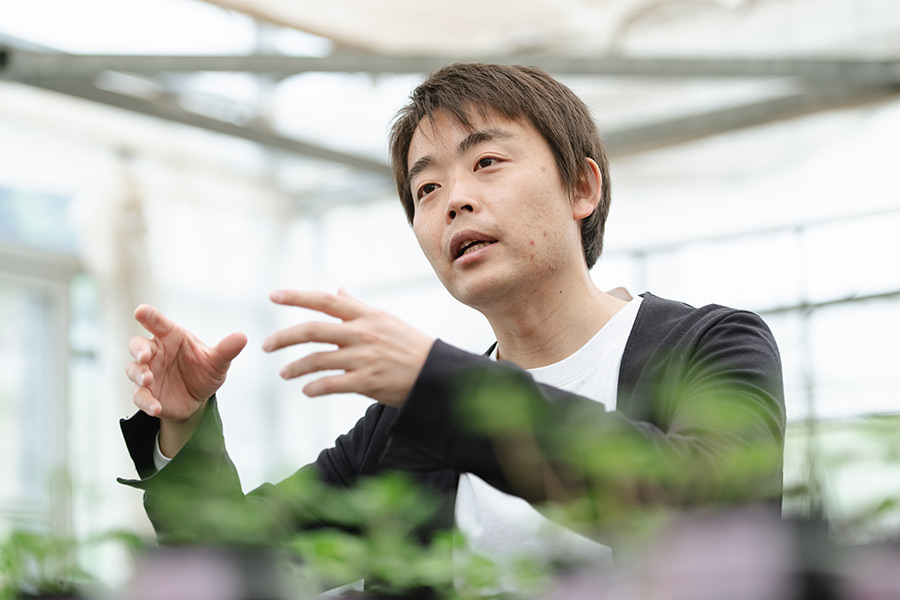
Traditionally, ecological research has centered around insects, animals, and plants, with little attention given to humans as subjects. Associate Professor Fukano has introduced a fresh perspective by highlighting the intricate relationships between humans and other living organisms.
I approach humans as just one species among many, from an objective and unbiased perspective. I hold the same appreciation for people as I do for plants and insects, and I am fascinated not only by the positive aspects of humanity, but also by the complex challenges that have emerged as a result of our development and urbanization.
This exploration of humans within ecological contexts has often been overlooked. What drives this distinct interest in humanity beyond traditional ecological study?
The influence of human activity on the environment is enormous. In a remarkably short span, humans have induced large-scale environmental changes, prompting rapid adaptation among other living organisms. My focus lies in examining human activities from an ecological standpoint and tracing how the resulting adaptations in nature, in turn, affect humans. Once I begin reflecting on this interaction, it becomes impossible to stop.
First-ever Discovery: The evolution of plants affected by heat islands
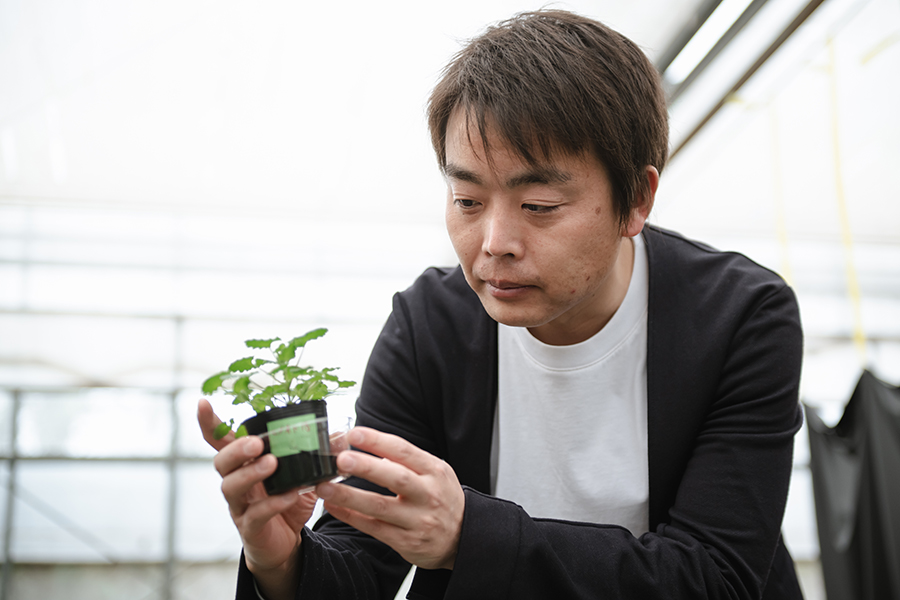
In October 2023, a groundbreaking study examining the impact of human activities on plant evolution gained worldwide attention. The focus of the research was a common weed known as Oxalis.
While walking near my home with my sleepy child in tow, I was struck by the abundance of red Oxalis. Oxalis is a highly prolific weed found worldwide, with both green and red leaf variants. Noticing that red-leafed plants were particularly prevalent in asphalt-paved areas, I hypothesized that this might be related to adaptive evolution in response to urbanization. Driven by this thought, I decided to investigate further.
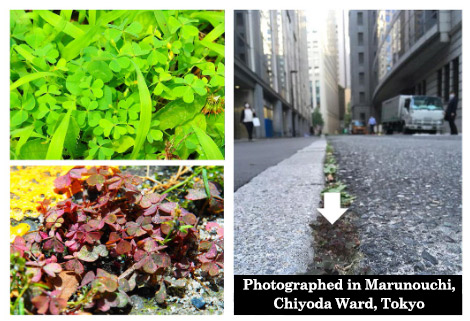
The study revealed an intriguing finding: the ratio of leaf colors differed even between areas just a few dozen meters apart—one a lawn and the other a residential area paved with asphalt. Further experiments in a controlled, urban-simulated environment showed that while green-leafed plants thrived at normal temperatures, the red-leafed variants outgrew their green counterparts at high temperatures (35℃).
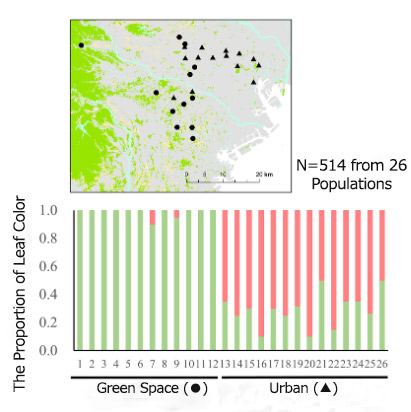
This phenomenon strongly suggests that red leaves have evolved in urban settings as an adaptation to the stress of elevated temperatures. Genetic analysis of red-leafed plants further revealed that this adaptation did not occur in a single location but independently in multiple regions.
To investigate whether this evolutionary trend might be occurring globally, we leveraged iNaturalist*, a platform for recording global biological observations, and analyzed 9,561 photos of Oxalis uploaded by citizen scientists from around the world. Our results confirmed that, as hypothesized, urban areas worldwide show a higher proportion of red-leafed Oxalis. This supports the conclusion that high temperatures in cities drive the evolution of red leaves, conferring heat resistance. This is the first study to demonstrate plant evolution due to the urban heat island effect.
*iNaturalist: A global citizen science platform where users can contribute and access data on biodiversity worldwide.
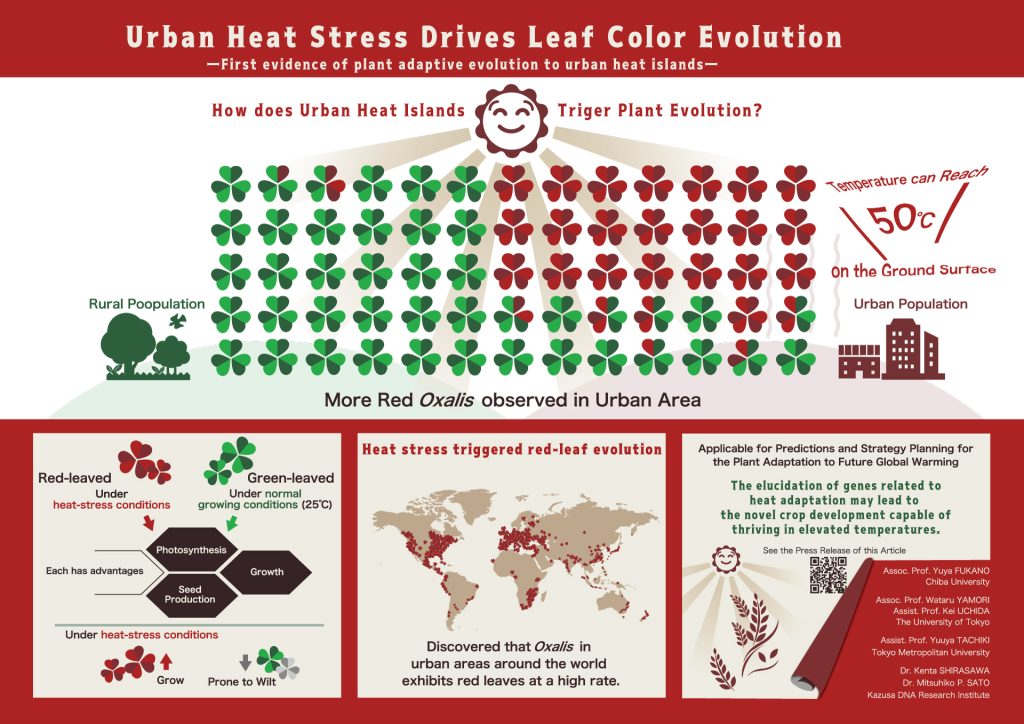
This paper garnered significant attention, reaching 10,000 downloads just four months after its publication.
Currently, the Kazusa DNA Research Institute is spearheading a citizen-participation open science initiative called ‘Minnade Katabami Project (Oxalis Project for All),’ aimed at investigating the evolution of red leaves. This project seeks to enhance both the quantity and quality of research on this common weed through the collaboration of citizens. All data collected is publicly available and can be used freely. Anyone interested is also welcome to engage in discussions. Please visit the project website to learn more and get involved!
Humans’ perspective on nature shapes biodiversity

Another reason to be captivated by the study on humans.
Simply put, we humans are also products of evolution. Living organisms do not evolve with a specific purpose in mind; rather, evolution is the process by which traits that enhance survival and reproduction become more prevalent in a species over time. In this sense, humans were shaped by a natural, mechanical process. The evolutionary traces embedded within us prompt deep reflection on where we come from and why we possess the traits we do.
Since my undergraduate years, I have been fascinated by evolutionary psychology—the study of how human psychology has evolved. Morphological, physiological, and behavioral traits such as height, skin color, and sleep cycles are products of evolution. Evolutionary psychology is a field in which certain psychological traits have also developed as a result of evolution.
Understanding humans’ perspective on nature from a psychological perspective is crucial
Humans’ view of nature is often unintentionally biased. Many of the endangered species that receive active protection are those that are considered cute or charismatic, such as mammals or birds, while less visually striking creatures, like insects, often lack sufficient funding or conservation efforts. The way we interact with and prioritize nature is strongly influenced by human emotions, and, in many cases, it is these emotions that ultimately determine which species are protected.

In modern society, particularly in urban areas, there is a pervasive aversion to insects. We investigated the root of this dislike from an evolutionary psychology perspective.
It has been suggested that this aversion to insects may have evolved as a survival mechanism to avoid disease and pathogens historically associated with certain species. Furthermore, the reduction in human exposure to insects in urban settings may have led to a decreased ability to distinguish between harmful and harmless insects, amplifying the dislike.
This emotional aversion to insects presents a significant barrier to their conservation. My focus is to clarify why these biases exist in conservation efforts and how they contribute to inefficiencies in protecting species from an evolutionary psychology viewpoint. Moreover, I am interested in whether it is possible to shift these emotional biases and, even slightly, improve conservation outcomes.
Agriculture in mountainous regions as a cornerstone for fostering a nature-positive Japan
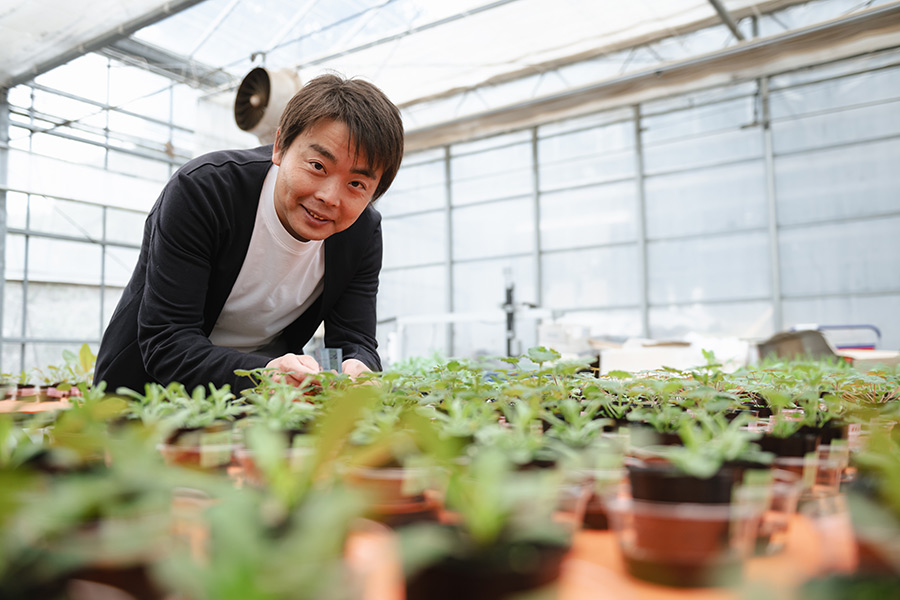
He was honored as one of “The Researchers with Nice Step 2023” for his innovative ideas and outstanding achievements in biodiversity conservation, drawing on insights from evolutionary psychology.
In recent years, ecological consciousness has become a critical component of societal value. The extent to which companies incorporate genuine environmental considerations has become a decisive factor for investors and business partners. However, mere superficial gestures—often referred to as greenwashing*—are quickly called out by discerning stakeholders. In response, there is growing pressure for transparent and objective environmental disclosure aligned with international guidelines to ensure the credibility of sustainability data.

*Greenwashing: the practice of misleading consumers into believing that an organization is more environmentally committed than it truly is.
This shift towards authentic ecological practice highlights the significance of the achievements recognized by the ‘The Researchers with Nice Step 2023*’ award. Notably, three of the ten recipients were ecologists, a recognition that would have been nearly unimaginable in previous decades. Being recognized in this manner signifies a significant step forward for scientific insight into practical solutions for biodiversity preservation and sustainable development.
*’The Researchers with Nice Step’ accolade, awarded by the National Institute of Science and Technology Policy (NISTEP) under the Ministry of Education, Culture, Sports, Science and Technology, is based on comprehensive surveys of approximately 1,600 experts, as well as significant research achievements and contributions to advancing science, technology, and innovation.
When asked about the measures necessary to protect biodiversity in Japan in the future, the immediate response was ‘agriculture.’
Sustaining agriculture, especially in mountainous areas with challenging geography, is critical, as these regions account for approximately 40% of the nation’s farmland. These areas are home to many endangered species, which rely on the waterways and grasslands for survival. The abandonment of agriculture in these areas would directly lead to the loss of these species. Thus, supporting sustainable agricultural practices is essential for preserving biodiversity.
Ecologists have a pivotal role in addressing this challenge, and one of the most promising solutions lies in the use of ICT. Through technology, we can boost agricultural productivity while minimizing environmental impact and reducing labor demands. For example, shifting the harvest date of broccoli by just one day from the optimal time can reduce profits by up to 20%. The system we developed, in collaboration with agricultural information science specialists, to estimate the optimal harvest date is simple yet highly effective in stabilizing profits and reducing substandard crops.

We are currently conducting joint research on electricity self-sufficiency through ‘solar sharing,’ a system that installs solar panels on agricultural fields. While solar sharing efforts are still in their infancy and much remains to be learned—such as how to balance sunlight exposure, soil conditions, and crop selection—the potential is immense. In the near future, we envision an agricultural system that harnesses renewable energy, protects biodiversity, and becomes more efficient through ICT. We are hopeful that this will lead to significant strides in sustainable agriculture and, ultimately, in achieving nature positivity.

● ● Off Topic ● ●
This is the first time I’ve heard of evolutionary psychology. What sparked your interest in it?
A simple question of “Why do humans find flowers beautiful?” Across the world, there is a shared cultural appreciation for flowers, and I believe it is likely an innate aspect of human nature. However, we don’t yet fully understand the evolutionary benefits behind this. That’s what inspired me to explore this question.
You are also active on X (formerly Twitter). Do you use it to store ideas for your research theme?
When I come across an interesting article or a piece of information, I tweet it as a kind of memo. The ideas I share are CC0 (Creative Commons Zero = copyright waived). Please feel free to use them!
I’m sure there are many people whose worlds have expanded because of your tweets. I look forward to your continued insights!
Recommend
-

Decoding the Secrets in Art: The Art and Legacy of Early Modern European Female Painters
2024.07.24
-
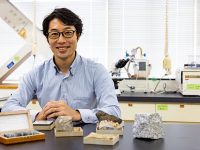
Exploring the uncharted waters in paleontology: Studying “Fossil Poop” as an academic survival strategy
2023.01.25
-

What causes nations and regions to perceive the COVID-19 crisis differently?〜Insights from the Humanities and Social Sciences Needed for Disaster Management Research
2022.12.12


